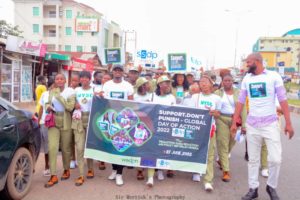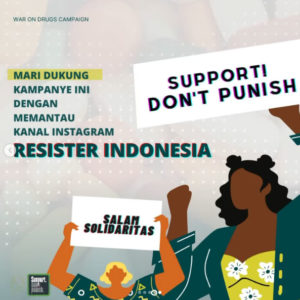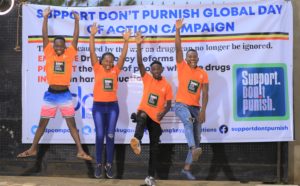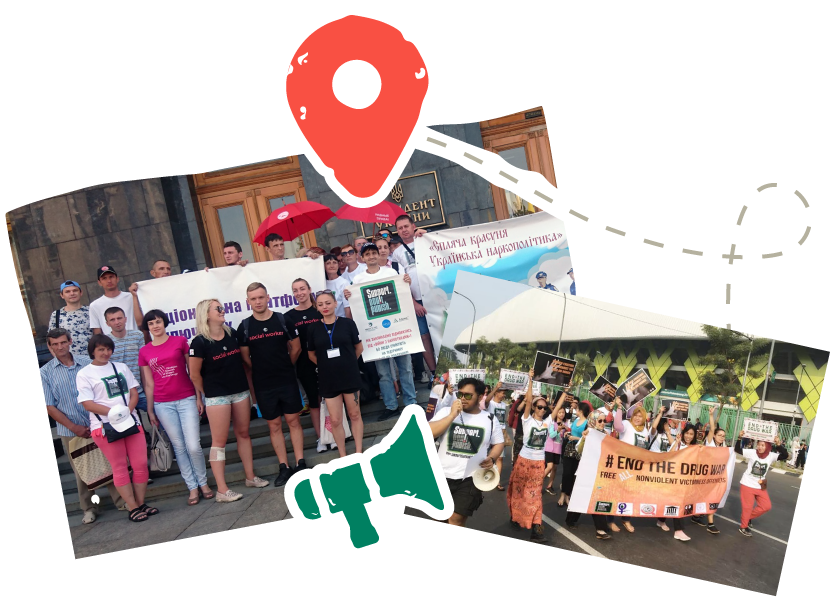The second edition of the Initiatives Programme (learn more about the first edition here) takes place between June – December 2022 and enable a broad range of activities ranging from capacity development, to awareness-raising, to political engagement by six community and advocacy groups in eight countries: Colombia, Ghana-Nigeria-Liberia, Indonesia, Kenya, Lebanon, and Uganda.
Below, you can find more information about each project and expected outcomes.
The Initiatives Programme is possible thanks to the invaluable support of the Elton John AIDS Foundation, which enables our global campaign to promote harm reduction and resource grassroots mobilisation.
Colombia | Led by Acción Técnica Social
Acción Técnica Social is a civil society organisation working with governments and local, national and international organisations to design and implement public policies, programmes and strategies in relation to drug use (with a harm reduction perspective), sexually-transmitted and bloodborne infections, vector-borne diseases and sexual and reproductive rights.
ATS’ initiative seeks to enshrine harm reduction into law, guarantee its adequate resourcing and implementation, and ensure access by all people who use drugs —all in collaboration with and centering the leadership of people who use drugs. Throughout the second half of 2022, ATS will devise a communications strategy to promote the importance of a legal basis to guarantee access to harm reduction interventions; promote community, civil society and academic participation in policy debates with parliamentarians; publish analysis and awareness pieces on high-reach media outlets and galvanise journalists’ work on these issues; and engage in relevant hearings and legislative debates.

Photo by Students for Sensible Drug Policy – Abeokuta chapter
Ghana-Nigeria-Liberia | Led by SSDP International
Students for Sensible Drug Policy (SSDP) International is an international grassroots network of students and young people, led by students and young people who are advocating for policy reform on the local, national, continental and global level.
SSDP International’s initiative seeks to promote youth-accessible harm reduction and drug services in these countries, where they are effectively nonexistent, as well as access by young advocates to national drug policy debates. The project, which will be conducted by the respective national committees of the SSDP network, will organise focus group discussions to collect young people’s stories and recommendations on how to lower barriers in access and promote engagement. These focus group discussions will feed into a report to be presented to national youth advocates as an advocacy tool, to leading drug-related organisations to favour engagement with young people who use drugs; and to decision-makers to promote engagement and advocat for reform. The initiative will conclude with a feedback, evaluation and learning session.

#SupportDontPunish Global Day of Action digital campaign by Resister Indonesia.
Indonesia | Led by ReSister Indonesia
ReSister Indonesia is a women-led learning group that exists to increase knowledge and collective awareness on the value of equality.
Resister Indonesia’s initiative integrates online and offline activism on the intersections between gender-based violence (GBV) and drug policy. The work-plan starts with a digital campaign to introduce drug-related issues, followed by online discussions on GBV in the context of the war on drugs (serving as an opportunity to strengthen cross-movement solidarity on this issue); facilitated and confidential community dialogues to foster the exchange of experiences and strategies of resistance —from which, providing consent is granted, a series of shareable infographics will be produced; policy dialogues with civil society groups working both on gender-based violence and drug policy reform, which will also be accessible to community dialogue participants and lead to the production of a list of policy recommendations leveraging ongoing legal reform processes; and a learning and healing field trip from which lessons and reflections will feed into the production of digital communications materials. The project will conclude with a series of evaluation meetings and a narrative report of the group’s experience with the Initiatives Programme.
Kenya | Led by Voices of Community Action & Leadership (VOCAL-Kenya)
VOCAL-Kenya is a health and human rights NGO committed to transforming the current prohibition on drugs and punitive drug control laws by moving towards drug policies based on balanced, evidence-based approaches.
VOCAL-Kenya’s initiative focuses on legal and judicial activism in relation to an ongoing process of legal reform that risks expanding the punitive capacity of the country’s drug laws and imperilling the harm reduction response. VOCAL-KE aims to mobilise civil society, community members and thought leaders to oppose the law’s harmful amendments before the High Court of Kenya. This initiative will be supported by a communications campaign via social and traditional media, as well as by an active process of engagement of peers in the follow-up of the court procedures. The initiative will also contribute to a broader move toward the development and enactment of legal reforms enshrining access to harm reduction in the country.
Lebanon | Led by Skoun
Skoun strives to ensure drug use and addiction are treated as a primary health issue. Skoun provides accessible treatment, education and protection for all people who use drugs and are committed to reducing the harms caused by substance use in Lebanon.
Skoun’s initiative seeks to institutionalise the work of a ‘Decriminalisation Coalition’ to energise a legal review process of the country’s drug laws. The activities envisaged by Skoun include mobilisation around the Support. Don’t Punish 2022 Global Day of Action, which will include the production of a joint statement by the Coalition addressing recently-elected parliamentarians on the importance of decriminalisation; the institutional development of the Coalition; a review of the draft law to amend the country’s drug legislation; and the development of an advocacy plan to revive the legal review process, which will include engagement with parliamentarians and media work.
Uganda | Led by Teens Link Uganda

Photo by Teens Link Uganda
Teens Link Uganda is a civil society organisation led by young activists from key populations that exists to promote and coordinate efforts to transform young key populations into leaders that can stand up for themselves and their communities to advocate and lead change that support young key population-focused interventions in sexual and reproductive health, HIV and harm reduction programming and policy development in Uganda.
Teens Link Uganda’s initiative seeks to mobilise support for harm reduction and decriminalisation through the Support. Don’t Punish Global Day of Action, and to equip advocates with innovative skills in digital photography, PhotoVoice for advocacy and story-telling, and leveraging these materials through online digital resources and direct engagement with media, decision-makers and opinion-formers.
